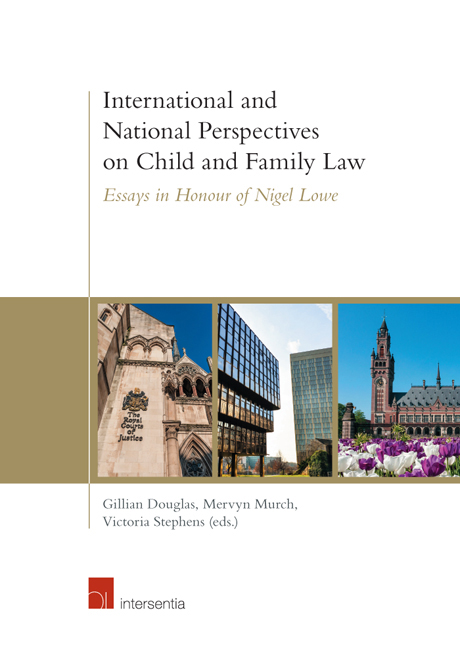Book contents
- Frontmatter
- Foreword
- Acknowledgements
- Contents
- List of Cases
- List of Contributors
- Introduction: Nigel Vaughan Lowe: An Appreciation
- Part I Family and Child Law in England and Wales
- Part II International Family Law
- Judging Parental Child Abduction: What Does it Mean to Adopt a Children's Rights-Based Approach?
- Judicial Activism: A 20-Year Evolution
- Globalisation of Adjudication in International Family Law: Serving International Families by Producing International Solutions
- Creating International Families: Private International Law and the Industry of Parenthood
- Issues in International Divorce Cases
- Non-Judicial Divorce in France: Progress or a Mess?
- The Istanbul Convention: Is Domestic Abuse Violence Against Women?
- Nationality and Migration Status in International Children's Law
- The Development of Child Protection Across International Borders for Children at Risk of Harm
- Nigel Lowe and International Family Law: An Immense Contribution
- The Spanish Constitutional Court and Protracted Child Abduction Proceedings: Time is of the Essence
- Non-Recognition of Child Marriages: Sacrificing the Global for the Local in the Aft ermath of the 2015 ‘Refugee Crisis’
- Juvenile Justice in Bulgaria: Reforms and Resistance
- Overriding Mandatory Provisions in EU Family Law Regulations
- Part III The Future for Family and Child Law
Globalisation of Adjudication in International Family Law: Serving International Families by Producing International Solutions
from Part II - International Family Law
Published online by Cambridge University Press: 12 October 2018
- Frontmatter
- Foreword
- Acknowledgements
- Contents
- List of Cases
- List of Contributors
- Introduction: Nigel Vaughan Lowe: An Appreciation
- Part I Family and Child Law in England and Wales
- Part II International Family Law
- Judging Parental Child Abduction: What Does it Mean to Adopt a Children's Rights-Based Approach?
- Judicial Activism: A 20-Year Evolution
- Globalisation of Adjudication in International Family Law: Serving International Families by Producing International Solutions
- Creating International Families: Private International Law and the Industry of Parenthood
- Issues in International Divorce Cases
- Non-Judicial Divorce in France: Progress or a Mess?
- The Istanbul Convention: Is Domestic Abuse Violence Against Women?
- Nationality and Migration Status in International Children's Law
- The Development of Child Protection Across International Borders for Children at Risk of Harm
- Nigel Lowe and International Family Law: An Immense Contribution
- The Spanish Constitutional Court and Protracted Child Abduction Proceedings: Time is of the Essence
- Non-Recognition of Child Marriages: Sacrificing the Global for the Local in the Aft ermath of the 2015 ‘Refugee Crisis’
- Juvenile Justice in Bulgaria: Reforms and Resistance
- Overriding Mandatory Provisions in EU Family Law Regulations
- Part III The Future for Family and Child Law
Summary
OVERVIEW
The number of international families has grown hugely, with the trend likely to continue with increased mobility of labour and travel. But they have been ill served by family law which remains stoically, and sometimes jingoistically, national. The international family laws which do exist sometimes work well but are too oft en dependent upon national interpretations and resources. This cannot continue. It is for the community of international family lawyers to debate and find solutions and then persuade both national governments and international organisations of their importance. Justice and fairness requires it.
THE LIVES OF INTERNATIONAL FAMILIES
There are now very many international families. These families live in an international community. Some are totally immersed in an entirely expat community within a country. Some adopt some aspects of the country, perhaps dependent upon the term of years they are likely to be living in that country. Some live entirely within the national community but may have one family member who maintains ongoing connections with the home country. There are national families with ongoing connections with other countries such as holding property or pensions abroad. International families are very varied. They share the distinctive quality of an overall lesser connection with home countries. This plays out in various aspects of their life.
Some work for international employers, with international terms of employment which include real risks of international travel or relocation as contract terms. They may be paid from abroad or indeed be paid in a country abroad. They may build up a pension abroad. These kinds of international families will be distinctly more comfortable with international currencies, transferring funds abroad and holding funds abroad. They are likely to be at least bilingual. Their children are more likely to be at international schools studying for internationally recognised exams, and in turn more likely to be meeting other children of other nationalities. They will live digital lives in order best to maintain contact with family and friends. They will be familiar with international developments either in their home countries or generally across the globe, for the simple reason that these developments affect them more than national families.
- Type
- Chapter
- Information
- International and National Perspectives on Child and Family LawEssays in Honour of Nigel Lowe, pp. 153 - 166Publisher: IntersentiaPrint publication year: 2018

